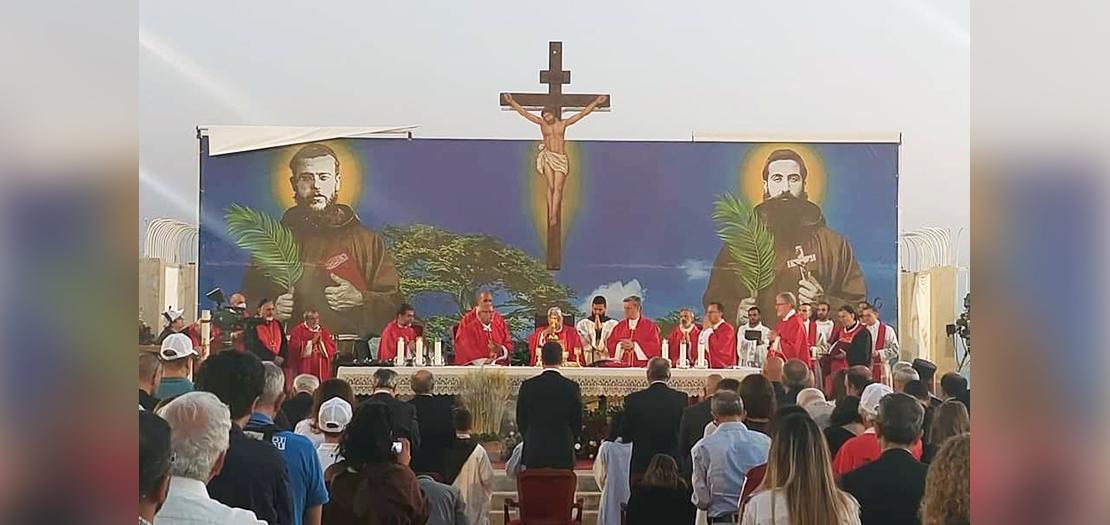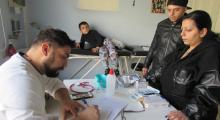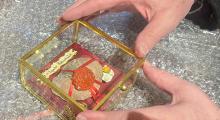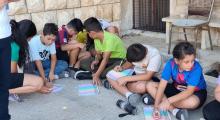Issued by the Catholic Center for Studies and Media - Jordan. Editor-in-chief Fr. Rif'at Bader - موقع أبونا abouna.org

A solemn ceremonial mass was held in the outer courtyard of the Monastery of the Cross – Jal el-Dib – Qenaya, during which the canonization of the honorable martyrs parents Leonard Owais Malaki and Touma Saleh al-Kabushites from the town of Baabdat was announced, in the presence of the President of the Republic represented by the Minister of Tourism in the caretaker government Walid Nassar, Speaker of the House of Representatives Nabih Berri, represented by Representative Hagop Pakradounian, and Caretaker Prime Minister Najib Mikati, represented by Caretaker Minister of Youth and Sports George Kallas.
Retired Major General George Shreim, representing Caretaker Minister of Defence Maurice Selim, Army Commander General Joseph Aoun, MP Elias Hankash representing the head of the Lebanese Kataeb Party MP Sami Gemayel, MP Razi Al-Hajj, Major Rana Asfour representing the Director General of Public Security Major General Abbas Ibrahim also attended. Former MP Ghassan Moukheiber, political, official, partisan and spiritual figures and a crowd of believers from different Lebanese regions.
The Eucharist was celebrated by the representative of Pope Francis, President of the Congregation for the Causes of Saints, Cardinal Marcello Semeraro, with the participation of the Papal Ambassador Monsignor Joseph Spitteri, General President of the Capuchin Order in the World Roberto Genuine, Apostolic Vicar of the Latin Congregation, Archbishop Cesar Assayan, Secretary General of the Synod of Bishops, Cardinal Mario Grek, and in the presence of the Maronite Patriarch. Mar Beshara Boutros Al-Rahi, the Syriac Catholic Patriarch Mor Ignatius Youssef III Younan, representatives of the heads of the Christian denominations, a group of metropolitans, general superiors and chiefs general of religious orders, priests, monks and nuns, and a crowd of believers from different Lebanese regions. The mass was served by the choir of Our Lady of Louaize, led by Father Khalil Rahma.
In the courtyard of the Monastery of the Cross and on the roads leading to it, pictures of the venerable, papal and Lebanese flags, and banners that carried expressions of congratulations and faith were raised.
Apostolic message
At the beginning of the liturgy, the Apostolic Vicar of the Latin Community, Archbishop Cesar Essaian, recited the apostolic message, which included the decree declaring the beatification signed by Pope Francis on April 18, and it stated: After taking the advice of the Congregation for the Causes of Saints, by our apostolic authority, we certify that the two venerable servants of God, Leonard Melki and Thomas Saleh, the two martyrs, the two recognized priests of the Capuchin Order of the Friars Minor, the two heroic apostles of the Gospel of Jesus until their blood was shed, to be called from now on to be blessed, to celebrate Distancing them in places and according to the rules specified by law, on the tenth of June of each year.”
About the lives of the Blessed
The person in charge of the Capuchin monastic order in the Vatican circles to pursue the lawsuits of the saints, the Capuchin monk Carlo Caloni in French, and his deputy, the Capuchin monk Tony Haddad in Arabic, read an overview of the lives of the Blessed King and Saleh, and then lifted the curtain on the two images adopted by the Church for them to the applause.
Semeraro
After reciting the Holy Gospel, Cardinal Semeraro delivered a sermon entitled: “Seeking justice for the poor and the weak, this is holiness,” in which he said: “If anyone thirsts, let him come to me” (John 7:37). These are the first words of Jesus that we have just heard revealed in the Holy Gospel, and they are already enough to touch and comfort us. He said, “Let him come to me.” But to whom is he saying that? Who are the best? Who are without sin? For those who are in harmony with the law, even the canon, and ultimately with the law of God? no ! Jesus simply says: Who is thirsty! That’s why he’s headed!”
He added, “Being thirsty means many things. The Bible, for example, speaks of “a thirst for justice,” and this is the thirst that man always feels. Even today and in many parts of the world, injustice injures humanity and causes great suffering. In the Beatitudes, Jesus praises this thirst, but – as Pope Francis explains – it is necessary to understand that the justice he speaks of begins to become a reality in each person’s life when one is just in his decisions, and then becomes manifest when one seeks justice for the poor and the weak and this It is holiness.
He continued, “But in our human language, the word thirst expresses something else. Express, for example, desire. We are all born of a desire: God’s will certainly, and that is why each of us is filled with desires and in all of them an expression of our history: joys and pains, successes and failures, hopes and disappointments. We still need to discern them, these desires, because none of us are transparent enough to know where our heart is.”
And he said, “This is what Jesus calls: Come to me! St. Thomas Aquinas comments: He says this in the impletione desideriorum, that is, the fulfillment of every good desire. To help us understand all this, the Evangelist explains that Jesus was speaking of the Spirit. So in this context, this evening, we also want to think of the figure of the Lebanese Capuchin friars, Father Leonard Melki and Father Thomas Saleh who have just been canonized as martyrs.”
He asked: “Who are the martyrs? To answer this question, Saint Ambrose considered that every time the Church announces the death of her Savior (and this is what we do when we celebrate the Eucharist), she receives a wound of love. Then he explained: “Not everyone can say that he was wounded by this love, but the martyrs can say that, those who were wounded because of Christ, precisely because they were wounded for his name, love him more. Let us consider, then, the earthly life of our blessed ones.”
He said: “Humanly, they are victims. Victims of a wave of hatred that repeatedly swept the end of the Ottoman Empire and mingled with the tragic events of the persecution of the entire Armenian people and against the Christian faith. In fact, when Our Blessings chose to launch the message, it was precisely in those years. At the beginning of the liturgy, we heard the account of the events that led to their martyrdom. So I will summarize it briefly. In December 1914, while all the other Capuchins were seeking refuge in safer places, Blessed Leonard chose to remain at Mardin Monastery to continue caring for an elderly brethren. On the 5th of June 1915, our Blessed was arrested and then subjected to violence and torture until he was killed along with his companions with stones, then daggers and hooked swords. Blessed Thomas was received in December 1914 with other friends in Urfa monastery. He was imprisoned with his other colleagues, held in different cells and subjected to several death marches and terrible torture with the aim of forcing him to convert from Christianity. Despite this, the memory of his calm and strength reverberates in the Lebanese Church.”
And he added: “If they are victims from a human perspective, as I indicated, from the perspective of the Christian faith, they are victorious. But what “force” are we talking about? Certainly not about the will of power that controls the instincts of evasion and control, which we witness with great pain at the personal level, at the level of groups, and at the social level. No! Rather, we are talking about the gift of spiritual strength, which in Catholic doctrine is the third essential virtue, that is, one of the virtues that constitute the foundations of a virtuous life. It is not, then, a matter of employing muscle strength, but rather of a passion for truth and benevolence, even of self-renunciation and life sacrifice. The purpose of the Church is also to bear witness to this power.”
He continued: “Benedict XVI, Pope Emeritus, wrote in the Encyclical, that in the truly difficult trials of life, especially when we must make the final decision to make truth come before luxury, job, and property, ‘we need witnesses, to martyrs, give themselves completely until they show us it – day in and day out. We need that for preference, even in the small choices of daily life, from good to convenient — knowing that we are exactly how we really live our lives.”
And he said: “And there is another question: Who gives the martyr the audacity to be a witness? It is the Holy Spirit who gives courage. This is the answer. We heard it from the Apostle Paul: “The Spirit helps us in our weakness.” The ancient Fathers tell us that martyrs like athletes, freed from the garments that hinder the race, and inflamed with the Holy Spirit (Spriritu sancto ferventes) ran through the stadium to win the wreath.”
And he concluded: “Let us pray, then, with these words borrowed from Saint Gregory of Nariki: “The blessed martyrs, who were perfected by their sufferings, now dance happily in an endless feast. Through their intercession and their prayers that are good for your eyes because they are tainted with the offering of their blood, receive us also, O Lord, and keep us firmly attached to you, until we reach eternal salvation. Trustworthy”.
The mass was concluded with a speech by the General President of the Capuchin Congregation, Abdullah Al-Nafili, in which he thanked everyone who attended, participated and worked to make the beatification mass a success.







